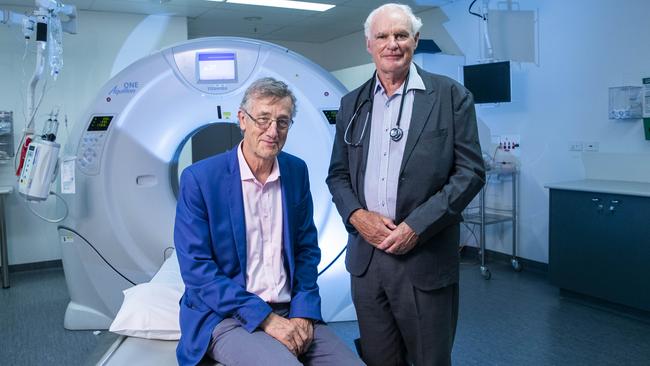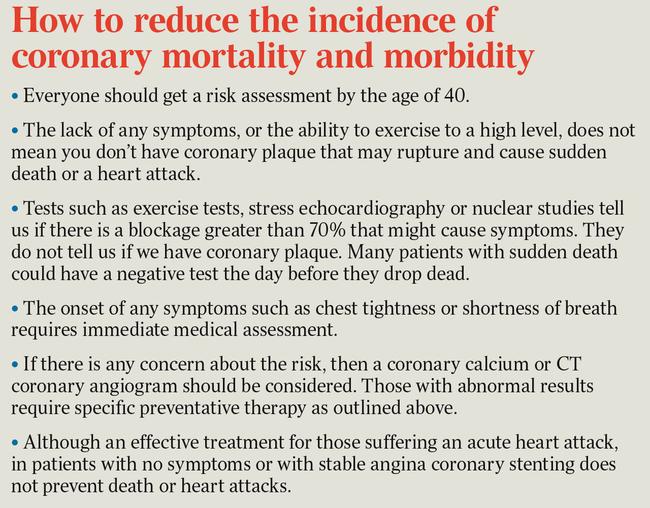Two tests ‘could end surprise heart attack deaths’, say top cardiologists
Virtually no one need die of an unexpected heart attack, two top cardiologists say, as they urge doctors to more frequently order two simple tests.

Virtually no one need die of an unexpected heart attack, two top cardiologists say, as they urge doctors to more frequently order two simple tests that can determine whether someone at high risk has plaque in their arteries.
As Shane Warne and Kimberley Kitching’s loved ones prepare to farewell the pair in coming days, cardiologists Brett Forge and Richard Harper AM are calling for widespread screening of those with risk factors for heart attack to diagnose coronary artery disease and have it treated before it results in a fatal heart attack.
The majority of heart attacks occur following prior symptoms of heart disease, but in 30 per cent of cases, fatal heart attacks occur without warning, as in the cases of Warne and Kitching.
“Often people say, ‘I feel fine, I’m riding long distances on the bike, I’m as fit as anything’,” says Dr Forge. “And they just don’t understand that the first symptom of a heart attack is sudden death in 30 per cent of cases.

“The thought that because they’re fit and they’re doing extreme exercise that insures them against sudden death is a myth.
“But almost nobody needs to die unexpectedly anymore.”
Dr Forge said that everyone over 40 should be having heart checks, in which cholesterol and blood pressure are monitored and diet and exercise plans are discussed.
For people identified with risk factors, two scans can be ordered.
One is a coronary calcium score that can measure calcium in the coronary arteries, which is present as a result of inflammation due to plaque and previous scarring in the artery, and another is a CT coronary angiogram (CTCA), which involves injecting contrast into a vein in the arm so that a scan can then outline both the wall and the lumen of the coronary arteries see whether plaque is present in the walls and to what extent it is affecting the lumen, even if the artery is not blocked.


“Imagine if we had a simple, non-invasive test we could do for cancer, and then we could diagnose it and say we’ve got an easy treatment that will prevent you dying from it,” said Dr Forge, a cardiologist at West Gippsland Hospital.
“Coronary disease is a reversible disease and more common than cancer.”
Coronary calcium scores are not reimbursed by Medicare but only cost $70-120 and CTCA scans are only Medicare-funded for those with suspected symptoms of coronary artery disease. A CTCA costs between $600-1200 if paying privately.
Appropriate treatment leads to shrinkage and stablisation of the plaque, making it far less susceptible to rupture.
Dr Forge says the two tests are not ordered often enough by doctors.
“The fact that treatment is so effective isn’t sufficiently emphasised by doctors and quite a lot of cardiologists don’t emphasise it. People tend to focus on stents being the treatment and they think it’s fixed them, but it doesn’t fix the arteries.”
Heart disease can be reversed through a healthy diet, regular exercise, blood pressure control and management of cholesterol levels. The levels of “bad” LDL cholesterol should be kept below 1.8mml/L in individuals with plaque build-up, preferably as low as 1.4mml/L. Attaining such low LDL cholesterol levels usually requires the prescription of statins.

Professor Harper, emeritus director of Monash Heart and chairman of the Medicare Benefits Schedule Cardiology Committee, said people generally would not get symptoms of plaque unless there was at least a 70 per cent narrowing in one or more of the coronary arteries.
Many cardiologists perform exercise tests, or order stress echocardiography or nuclear studies but those tests in general only come back positive if the blockage in an artery is greater than 70 per cent – they cannot diagnose whether lesser degress of plaque is present.
“You could have quite a lot of narrowings that are much less than 70 per cent in your coronary arteries, and they’re not causing you any symptoms, any plaque in the wall is potentially unstable, particularly if it’s got a lot of cholesterol in it, and rupture and cause a heart attack.
Professor Harper said the aim of treatment is to stablilise the plaque in such a manner as to prevent rupture and heart attack and possible sudden death.
That was why it was so important to diagnose when plaque was present even in the absence of symptoms.





To join the conversation, please log in. Don't have an account? Register
Join the conversation, you are commenting as Logout